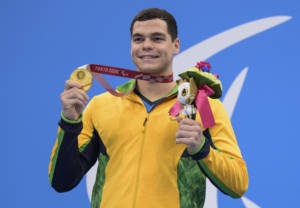Virtus Ambassador & Paralympic Champion Gabriel Bandeira

Gabriel Bandeira posing with his Gold Medal at Tokyo 2020 Paralympic Games. Photo Credit: OIS/Joel Marklund.
It may be surprising to know that the Paralympian was actually training to compete in the Olympic Games until he was diagnosed with intellectual impairment. Gabriel had a very happy childhood with supporting parents who never made him feel he had an intellectual impairment. When his friends and coaches mentioned to him that he might have an impairment and that he should get a diagnostic test done, Gabriel refused it twice because he never felt he was different as it was his ‘normal’. Later in 2018, Gabriel finally agreed to get his test done and was given his eligibility class. Bandeira had a smooth transfer to the Paralympic movement.
“I felt embraced by the Paralympic Movement. It was a very peaceful and light process. I felt like I really could be myself. While I was training with the Olympic athletes, the coach gave the same instructions to the whole team and everybody followed them. But, in the Paralympics training, the coach pays attention to each swimmer according to their impairment. For example, he prints my training so that I don’t struggle with memorising it, he explains it carefully and depending on the situation he knows how to talk to me. When he gives constructive feedback to me, it takes me some time to process it and I can also be aggressive or very sad about it, and the coach stays very calm and patient with me the whole time whilst motivating me until I understand my fault so I do not drop my performance during the session and to improve it instead.”
Bandeira believes there could be others like him who are not aware of having an intellectual impairment, and who want to compete in high-level sports but are unable to do so because they might not receive the proper guidance as per their impairment-specific needs. Bandeira wants to advocate for intellectual impairment and increase awareness about Paralympic sports for those who want to compete.


